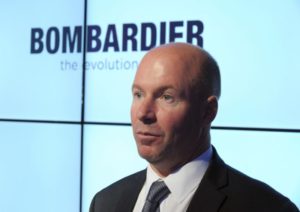
Jerry Dias’ attempt to raid the TTC workers (ATU Local 113) earlier this year was a spectacular flop. What has it meant for our union, and the broader Canadian labour movement?
Dias argued that he was acting on behalf of “union democracy” and “workers right to choose” their union. Dias also appealed to Canadian nationalism. The counter argument is that the attempted raid was, in fact, cooked up behind the backs of the members of Local 113, and was all about an attempt to raid a section of another union that is a member in good standing of the Canadian Labour Congress, and thus damages the unity of the union movement. The spectacular failure of the raid has greatly damaged the reputation of Unifor, and made it harder to organize non-union workplaces.
What happened?
On February 7, 2017, Jerry Dias held a press conference along with Bob Kinnear, President of ATU Local 113 which represents the workers at the Toronto Transit Commission. He portrayed himself as a defender of union democracy, and attacked the International leadership of the ATU for putting Local 113 in trusteeship and removing Kinnear as president. He repeated Kinnear’s claim that Local 113 members were sending $6,000 a day in dues to the US and “getting nothing in return”. Dias vowed to provide financial and legal support to Kinnear.
What Dias did not reveal, was that he had cooked up the whole affair with Kinnear before the trusteeship was imposed.
Here is the timeline:
- February 1 – Kinnear sends a letter to CLC President Hassan Yussuff invoking Article 4 of the CLC Constitution – a process whereby union members can change unions if their problems cannot be resolved.
- February 2 – Yussuff contacts ATU Canada President Paul Thorp to inform him of Kinnear’s letter.
- February 2 – tellingly, an email from a law firm is sent to ATU Local 113 with direction that it be given to Kinnear. The letter provides advice on how to deal with a trusteeship. The email is cc’d to Scott Doherty, assistant to Dias, and to Anthony Dale, a lawyer employed by Unifor.
- February 3, the ATU imposes a trusteeship on Local 113. They stated the trusteeship was necessary because of “Brother Kinnear’s flagrant disregard of the Local’s bylaws and the decision making processes set forth therein. Thus, it was necessary to restore democratic procedures, ensure continuity of representation, and protect their financial interests.”
- February 3 – Hassan Yussuff notifies the ATU that he is suspending the ATU’s protection from raiding under Article 4. There seem to be no grounds for doing so under the CLC Constitution, and Yussuff is in a blatant conflict of interest – he is a longtime Unifor staffer.

Toronto Sun front page, February 4, 2017 - February 4 – the media campaign in support of Kinnear begins with the Toronto Sun front page blaring “Yankee Invasion”.
Evidence of Raiding
The lawyer’s email is the proof that the plot had been underway for some time. More evidence appeared later. The website rankandfile.ca obtained a recording of a phone conversation between two ATU Local 113 executive board members that took place on January 31, 2017 – before Kinnear’s letter was sent to Yussuff. In the call board member Tony Barbosa explains to John DiNino what he has learned about the plot and how it will play out. He knows that Kinnear’s plan is to provoke the ATU to trustee the local. Most shockingly, he knows that the CLC will then remove anti-raiding protection from the ATU to facilitate a raid by Unifor. The full recording is available at rankandfile.ca “Who’s the big white shark”, but here is the key revelation:
It is also revealing that Barbosa reveals the extent to which Unifor’s plans are being made with the likely knowledge and support of key Liberal Party leaders – Justin Trudeau and Kathleen Wynne are both mentioned. In fact, Dias was brazen at the February 7 Press conference in appealing to Local 113 members to join a union “that has a relationship with the mayor, with the City Councillors, with the Provincial government, with the Federal government.”
Dias and Kinnear Plot Fail
Eventually the attempted raid fell apart – mainly because of the evident lack of support from rank and file ATU members and leaders. Out of 17 executive board members, 13 rejected Kinnear’s efforts and sided with the ATU. So did more than 95% of elected stewards. Finally, Kinnear threw in the towel and retired. Questions remain, however, including the claims raised by Dias.
Democracy?
It is hard to take seriously Dias’ claim that he was acting in support of union member’s right to choose and democracy. Dias has shown little respect for democracy in his own organization – check out the ratification votes in the 2016 auto contracts, which were the lowest in the union’s history, without the slightest self-reflection about why. If Jerry Dias really believes that we should “let the members choose”, why has Unifor spent the last 6 months or more trying to prevent inshore fishers in Newfoundland from having a vote on leaving Unifor? If Dias is the promoter of democracy, why were 5 locals in BC kicked out of Unifor without even a hearing (which is supposed to be guaranteed by the Unifor Constitution)? As far as the ATU Local 113 issue – there is zero evidence that Jerry Dias cared about the rank and file TTC workers. He backed Kinnear, thinking he would be able to scoop up over 10,000 members and their dues. Kinnear and Dias forgot to ask those workers what they wanted.
$6,000 a Day in Dues
Which brings us to the question of dues. You should always be suspicious of an anti-union or right-wing agenda when someone starts yelling about dues or taxes. Jerry is on thin ice when he invites ATU members to object to the portion of their dues that go to their International office. Unifor dues are significantly higher than ATU dues – more than double, in fact. If ATU Local 113 were to join Unifor, approximately $13,650 a day in dues would go to the Unifor National Office (apart from the portion that would stay with the Local union). In other words, Unifor would stand to gain close to $5 million per year.
Raiding versus Organizing
One of the problems with raiding is that it causes division in the labour movement, while doing nothing to help organize the 70% of workers who are not currently union members. Unfortunately, this sort of crass attempt to grab members of another union has too long a history in Unifor’s predecessor union, the CAW. A horrible example was in 2007, when Buzz Hargrove pledged $5 million of CAW money to support Tony Dionisio and his phantom “Canadian Construction Workers Union” in a futile attempt to raid LIUNA Local 183. Dionisio had been a LIUNA leader who was removed because, according to LIUNA, “three years of independent investigations and hearings, including numerous decisions of Ontario courts and the Labour Relations Board proved beyond any doubt, that Dionisio and his ruling circle in Local 183 were guilty of numerous unethical practices that severely violated Canadian trade union values. They exploited undocumented workers. Benefits and pension credits were stolen. Union members and staff were covertly spied on. Collective agreements were forged. Millions of dollars were misallocated.” Dionisio ended up with a unit of 8 workers, and a string of decisions that his operation was not a legitimate union. Was this a worthwhile use of millions of dollars of dues from CAW members?
The founding of Unifor in 2013 seemed an opportunity for a new direction – $10 million a year was pledged for organizing unorganized workers. The past four years have been disappointing – despite a staff of 16 national reps, a director and 7 full-time community-based organizers, the Unifor organizing department has underperformed. Only a few thousand new workers have been brought into the union. The total number organized in 2016 was 3,030. Perhaps that is why the 11,000 members of ATU Local 113 were such an attractive target.
Conclusion
The attempted raid of Toronto transit workers has been nothing less than a train wreck. It has damaged the reputation of Unifor, which will only make it harder for us to appeal to the unorganized workers that we need to attract. It has divided the labour movement in Canada, and worsened relations with a number of unions. And it has not promoted democracy in the union movement, especially within Unifor. Which Unifor members approved this awful strategy? How much of our money was spent on Bob Kinnear’s legal bills? On February 23 Kinnear published a full-page ad in the Toronto Star (at a cost of $50,000 at least) and two other publications – who paid for that, and who authorized it? The Unifor membership never authorized this destructive waste of our funds. We do need more democracy – we need it in Unifor. We need the right for our members to review such wrong-headed actions as the attempted raid on ATU Local 113, and the right to reject them.



